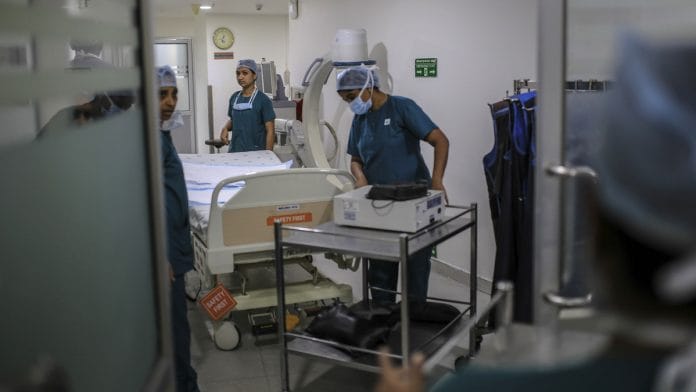New Delhi: No sightseeing, no cab-sharing and no shopping, cap on the number of attendants, and contact-less service in hotels and hospitals — these are among 18 recommendations the Indian medical tourism industry has made to the central government as it wants the multi-billion dollar sector to resume functioning, ThePrint has learnt.
The industry has come up with a comprehensive list of standard operating procedures (SOPs), which has been submitted to the Ministry of Industry and Commerce, Ministry of Civil Aviation, Ministry of Tourism, and Ministry of Health and Family Welfare for approval, according to sources.
Medical value travel (MVT) companies have prepared the SOPs, in collaboration with the Federation of Indian Chambers of Commerce and Industry (FICCI) and top hospital chains.
The move has come amid a loss of at least $1 billion, or Rs 7,500 crore, in the last six months, according to industry estimates.
A Ministry of Tourism official said “the discussions on SOPs are in advanced stages”.
“It is a very complicated matter. It starts with resumption of international flights and then requiring detailing of procedures on testing and quarantine. We are finalising the details but it all depends on several other ministries,” said the official, who didn’t wish to be named.
India is already in advanced negotiations for establishing air travel “bubbles” with several countries including the US, Germany, and France based on “Covid-safe travel zones” to restart the scheduled international passenger flights.
“Now, the final call on the resumption of international flights and allowing inflow of foreign patients is in the hands of the Central government,” said a senior FICCI representative who was involved in making the SOPs. He added that the World Health Organization recommendations were taken into consideration while designing the SOPs.
However, these steps will push the cost of treatment up by at least 30 per cent, according to the Foundation of Healthcare & Wellness Promotion (FHWP), a lobby of 60 medical tourism companies that operate across India and act as local guardians to travelling patients.
Also read: Amit Shah isn’t alone, most Covid-positive politicians opted for private hospital treatment
What the SOPs say
At least 18 recommendations have been sent to the Centre for consideration, said Vidit Bahri, managing director, Sukoon Hospital, a mental health hospital governed by Fortis Healthcare, who was also part of the industry group on SOPs.
Under the SOPs, the Covid testing of the patients and the attendants, 48 hours prior to their scheduled flight, could become mandatory. Moreover, only one attendant is likely to be allowed to travel along with the patient.
“The patient and attendant need to get the RT-PCR test done 48 hours before the scheduled flight and carry the report along with them,” Bahri said.
“We have not suggested institutional quarantine… The submitted SOPs mention that the patient and the attendant need to comply with the country’s quarantine norms and strictly follow the same during the period of stay,” he added.
It is likely that travelling for medical treatment, with children and adults over 60 years of age, will not be not encouraged, said the FICCI source.
The new rules could also restrict the movement of patients and their relatives during the stay. Earlier, the MVT companies used to plan their shopping and sightseeing activities. Now, it won’t be allowed,” said Bahri. “If given SOPs will be approved, the MVT companies will suggest online shopping instead of physical shopping to avoid risk of infection. Also, the patient and attendant may not be allowed to go for sightseeing.”
Moreover, the use of public transport by the patient or attendant is likely to be prohibited.
Also read: Mauritius has stamped out coronavirus. Now, it needs tourists
‘Receiving queries’
The industry has already started receiving queries from international patients for cardiovascular, oncology and organ transplant procedures, according to Amit Sharma, chief executive of eExpedise Healthcare.
The company claims to have received several queries from patients in Bahrain, Oman, Kuwait, United Arab Emirates and Fiji. “We have also started getting back to those clients who were planning to visit India before the lockdown,” Sharma said.
Bahri’s hospital has been receiving queries from patients in Afghanistan, Iraq and Bangladesh.
Companies like eExpedise are promoting India as a “safe and hygienic” country with lesser active cases of Covid-19 and higher recovery rate.
Costlier treatment
According to FHWP president Dalip Chopra, treatments could get costlier by at least 30 per cent. “The total expenditure on the treatment package depends on the number of days the central government will fix as mandatory isolation,” he said.
Amid Covid fears, the service providers also seek to disable the facilities of shared hospital rooms and cabs.
“Now, each patient and his attendant will be transferred from the airport to the hospital or to hotels in private vehicles only unlike previously when we booked one big vehicle for pickup of all clients, attendants,” said Sharma.
“Similarly, in hospitals, private rooms will be given to each patient unlike earlier when rooms were shared. This will increase the cost,” he said.
Massive blow to industry
According to Chopra, the industry has earned “zero revenue” since March.
“We have lost at least $1 billion revenue in the last six months. Even now, it will take at least 6-9 months to recover from this shock. Moreover, not many international patients will plan their visit unless they are very critical as everyone fears visiting hospitals,” he said.
According to the Ministry of Tourism, India ranked as the third most popular medical tourism destination in 2015 when the industry was worth $3 billion and nearly 2.34 lakh patients arrived for treatment.
By 2017, the number of arrivals had gone up to 4.95 lakh and India’s medical tourism industry was pegged to grow by 200 percent by 2020, hitting $9 billion (around Rs 68,000 crore).
Also read: India beats Maldives, Sri Lanka to become a favourite tourist spot in South Asia, finds study






